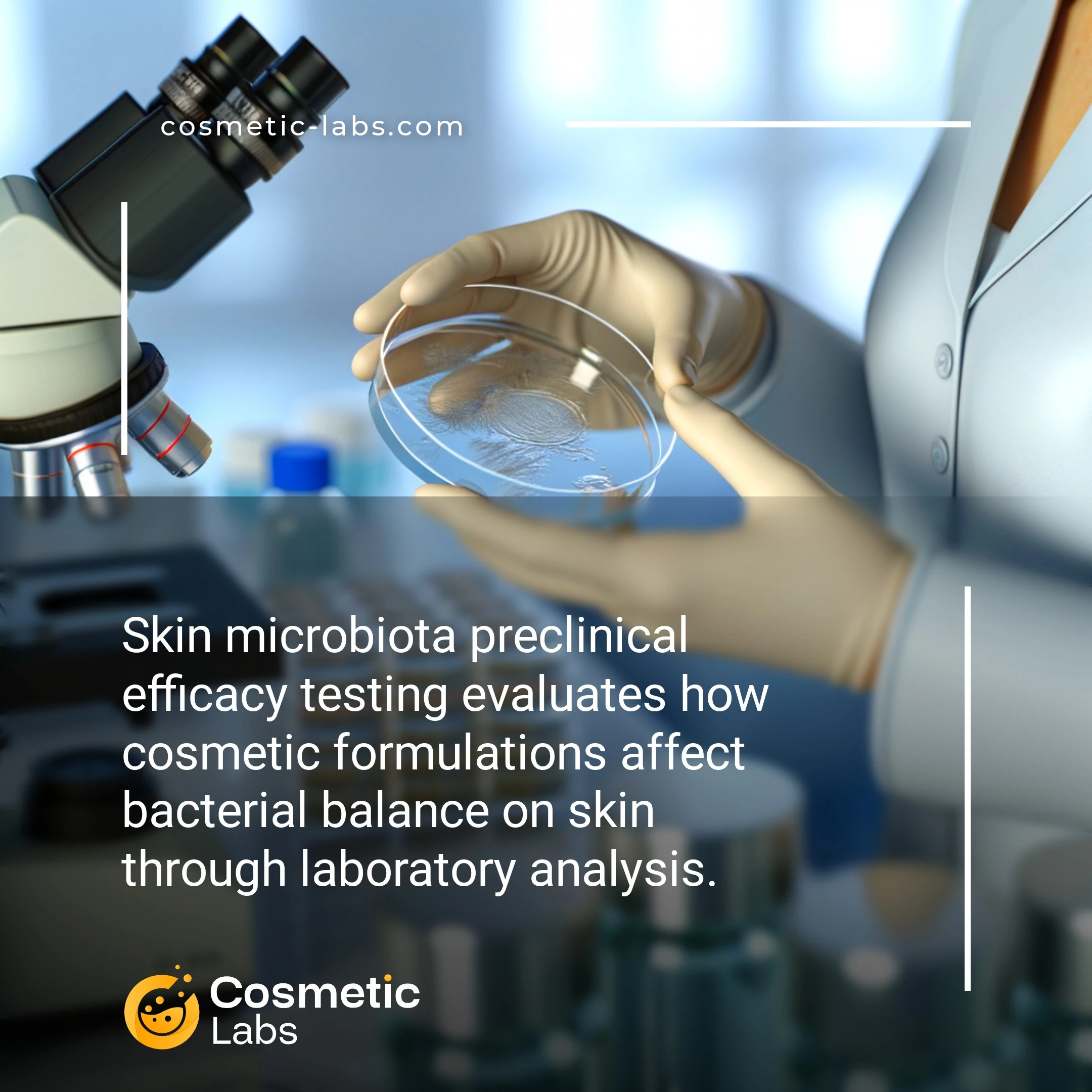Skin Microbiome Testing Services for Cosmetic Brands

What is Skin microbiota efficacy testing?
Skin microbiome preclinical efficacy testing services evaluate how cosmetic formulations interact with beneficial bacteria naturally present on human skin. Labs use in vitro bacterial culture assays and microbiome sequencing to measure whether your product supports healthy skin flora balance or disrupts microbial diversity. This testing reveals if ingredients like prebiotics or probiotics actually deliver their claimed microbiome benefits before costly clinical trials.
Why do you need this service?
Cosmetic labs use skin microbiome efficacy testing to validate probiotic skincare formulations and demonstrate bacterial balance restoration in acne-prone skin. Brand owners rely on these microbiota assays to support regulatory submissions with concrete data showing how their products influence beneficial bacteria populations, giving them measurable proof of microbiome benefits for marketing claims.
Who provides Skin microbiota efficacy testing services?
All cosmetic labs providing Skin microbiota efficacy testing services
There is no company providing these services at the moment.
Skin Microbiome Preclinical Efficacy Testing Services
Skin microbiome testing validates how cosmetic formulations interact with beneficial bacteria on the skin’s surface. Labs analyze microbial balance changes, antimicrobial effects, and prebiotic activity to demonstrate product safety and efficacy before human trials.
Microbial Culture Analysis and Bacterial Interaction Studies
Labs use skin microbiota testing to evaluate how ingredients affect bacterial populations like Staphylococcus epidermidis and Cutibacterium acnes. Testing protocols measure bacterial growth inhibition, selective antimicrobial activity, and prebiotic enhancement of beneficial microbes.
Standard test methods include:
- Minimum inhibitory concentration (MIC) testing against pathogenic bacteria
- Selective antimicrobial assays for acne-causing organisms
- Prebiotic activity measurement using beneficial skin bacteria
- Biofilm disruption studies for anti-aging and cleansing products
Results help brands substantiate claims about microbiome-friendly formulations and targeted antimicrobial benefits.
Microbiome Diversity and Metabolic Activity Assessment
Advanced testing measures how products influence microbial diversity and metabolic functions that support skin health. Labs analyze bacterial metabolite production, pH modulation, and community structure changes using molecular techniques.
Key assessment areas include:
- 16S rRNA sequencing for bacterial community profiling
- Metabolomic analysis of bacterial byproducts
- Short-chain fatty acid production measurement
- Skin barrier function correlation with microbiome changes
These studies provide data for regulatory submissions and support marketing claims about microbiome balance. Connect with specialized labs on our platform to design microbiome testing protocols that align with your product positioning and target skin concerns.
5 subcategories of Skin microbiota efficacy testing services
There are no results matching your search
Practical Applications of Skin Microbiota Preclinical Efficacy Testing
Cosmetic labs use skin microbiota preclinical efficacy testing applications to validate product claims and demonstrate microbial balance improvements before market launch.
Probiotic Skincare Product Development
Labs test probiotic serums and creams using 16S rRNA sequencing to measure bacterial diversity changes. Testing protocols track Staphylococcus epidermidis and Cutibacterium acnes populations over 28-day periods on reconstructed skin models.
Brands receive quantitative data showing percentage changes in beneficial bacteria populations. Results support marketing claims about microbiome restoration and skin barrier function improvement.
| Testing Method | Target Microbes | Timeline | Key Metrics |
|---|---|---|---|
| 16S rRNA Sequencing | Total bacterial diversity | 14-28 days | Shannon diversity index |
| qPCR Analysis | Specific bacterial strains | 7-14 days | CFU/mL counts |
| Metabolomics Profiling | Microbial metabolites | 21 days | Metabolite concentration |
Antimicrobial Ingredient Safety Assessment
Testing services evaluate preservatives and active ingredients for selective antimicrobial activity. Labs use minimum inhibitory concentration (MIC) assays to determine optimal dosing levels that target harmful pathogens without disrupting beneficial microbes.
Protocols include testing against *Staphylococcus aureus* and *Malassezia* species while monitoring commensal bacteria survival rates. Data helps formulate products that maintain healthy skin microbiome balance.
Ready to validate your skincare formulations with microbiome testing? Contact specialized labs on our platform to discuss your specific testing requirements and timeline.

